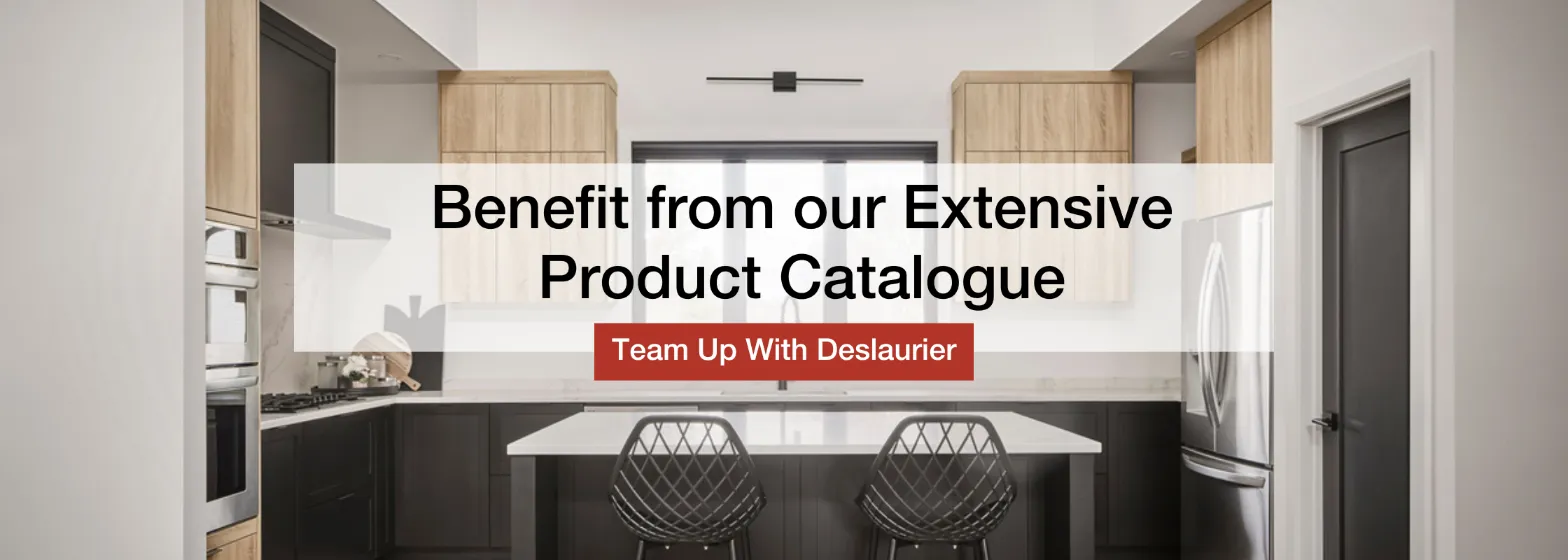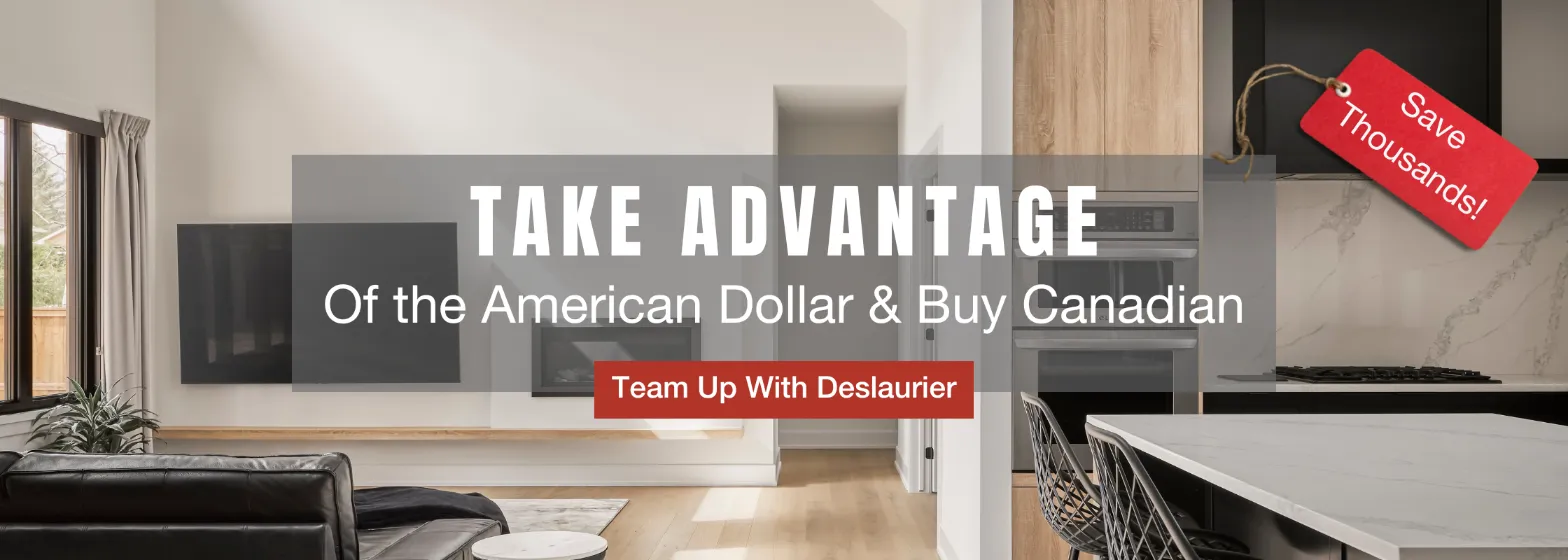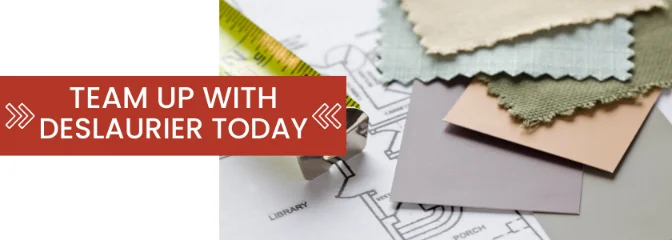17/06/2022 • Blog, Product Reviews, Comparisons
Plywood vs. Particle Board: Comparing Cabinet Box Construction
Estimated Read Time: 5 Minutes
Kitchen cabinets are one of the most important elements of your entire home. They contribute to the overall aesthetic and beauty of your space while also providing function and storage to your kitchen.
While there is plenty of information out there on cabinet fronts (check out our Learning Centre for comparisons like MDF vs. Natural Wood Cabinets), most people tend to overlook the construction of their cabinet boxes.
At Deslaurier, we’ve spent over 40 years designing and manufacturing high quality custom cabinets. In that time, we’ve narrowed our product down to two high quality, popular cabinet box materials: plywood and particle board.
For this article, we’ll focus on the construction of cabinet boxes – rather than their fronts – and compare the qualities of plywood and particle board.
Let’s get started!
Plywood Cabinet Boxes
Plywood cabinet boxes are made with sheets of natural wood veneer used for the exterior cabinet surface while a softer wood species, like poplar, fur, or aspen, is utilized for the core layers.
The softer interior woods used will often depend on the location of where they’re sourced from. Cabinet boxes manufactured in western Canada will typically use fur trees, while eastern products tend to be sourced with the more locally populous aspen wood.
At Deslaurier, our plywood cabinet boxes are manufactured with maple veneer exterior sheets that are compacted onto softer, aspen wood sheets for the core.
.jpg?width=600&name=plywood%20(1).jpg)
Due to the compact sheets, plywood holds nails and screws extremely well. You’ll rarely experience any splintering when installing high quality plywood cabinets.
Particle Board Cabinet Boxes
Particle board (or particlecore) is made from recycled wood fibres, mixed and compacted with resins, then adorned with a melamine finish for a smooth exterior.
For a lot of homeowners, personal preference or preconceived notions of the material will dictate what cabinet box construction they choose.
Even as recently as 20 years ago, plywood was considered the “less toxic” option compared toparticle board. At the time, particlecore had a similar stigma to MDF cabinet fronts, which led many consumers to view them as toxic and unsafe due to the glues and resins they used.
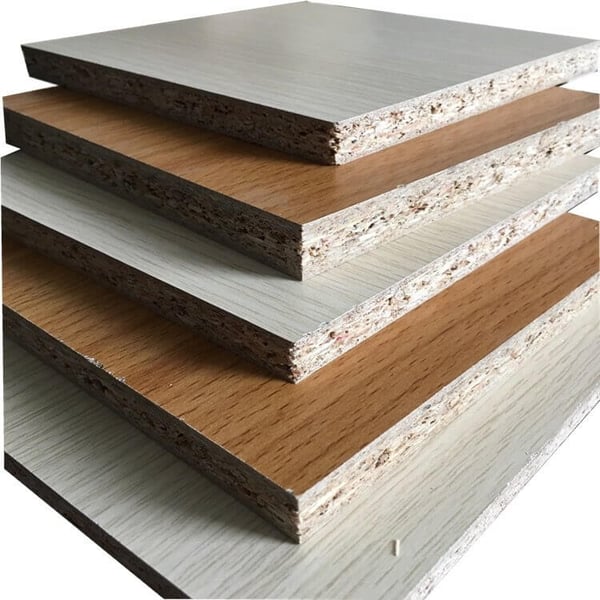
Today, particle board cabinets have all but removed those tainted viewpoints. They’re anything but toxic, as they incorporate much safer resins and glues with miniscule off-gassing.
At Deslaurier, both our plywood and particle board cabinet boxes will have a melamine interior finish, with white and maple being the most popular.
Unlike plywood cabinet boxes, particle board’s substrate is not as friendly a material for nails or screws to hold into place. The screws may loosen slightly over time, and could splinter the melamine interior finish when being installed.
NuGreen Particle Board Cabinet Boxes
We would be remiss not to touch on our environmentally friendly option, NuGreen particle board cabinets.
At Deslaurier, we partner with Tafisa to provide our clients with the option of their Evolo NuGreen particlecore cabinets.
NuGreen particle board is manufactured using 100% recycled wood fibres with resins that emit less off-gassing and formaldehyde than standard particle board.
Regular particle board emits .09 parts per million of formaldehyde. NuGreen, however, emits only .05 parts per million.
While that may not sound like a stark difference, it can be extremely helpful for homeowners who are sensitive to the effects of off-gassing.
Ready to select the cabinet for your dream kitchen? Kickstart your design process and book a free consultation with a Deslaurier kitchen expert today!
Plywood vs. Particle Board: Strength & Weight
Without question, plywood cabinet boxes are the stronger option. There’s a reason plywood is one of the most utilized building materials throughout the world.
That’s not to say particle board isn’t a quality product for kitchen cabinets. Particlecore is still much stronger than it once was, but its core materials don’t quite have the strength of plywood’s compounded layers.
Not only can plywood support more weight than particle board, but it’s also a lighter cabinet box!
This comes from the fact that plywood has fewer materials. Particle board’s myriad of additional glue and resin compounds result in a heavier cabinet box than plywood’s condensed layers.
You might think, “well, why would the weight of my cabinet box matter?”
And it most likely won’t matter when we’re talking about basic kitchen storage. However, when you’re dealing with a large number of upper wall cabinets, the lighter cabinet boxes will provide an easier installation process.
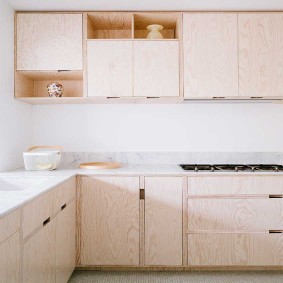
Plywood vs. Particle Board: Moisture & Durability
Whenever you’re considering materials for your kitchen, it’s always vital to understand the positives and negatives when it comes to their overall durability.
High-quality particle core is more than durable enough for kitchen cabinets, but they will be more prone to dents and scratches compared to plywood.
Since plywood cabinets are produced from sheets of real wood, they can be susceptible to the natural occurrence of warping. Particlecore’s recycled wood fibres and man-made resins, on the other hand, are much less likely to warp since it is an engineered product.
The main concern for particle board cabinets is their vulnerability to moisture. If the particle board is exposed to a prominent amount of moisture or water, the underlying core will begin to swell and the exterior sheet could splinter.
Plywood is generally quite formidable when it comes to moisture resistance. It doesn’t stand up well to long-term exposure to water – not many materials do – but with minimal subjection to water or moisture, plywood will retain its structural integrity quite well.
Plywood vs. Particle Board Cabinet Boxes: Cost
The cost of raw materials and their individual manufacturing processes dictate how expensive plywood and particle board are.
Particle board cabinets are a much more affordable product thanks to their recovered wood fibres and resins being far less expensive than sheets of authentic, natural wood. Sourcing natural wood products will always be pricier than the cost of engineered materials.
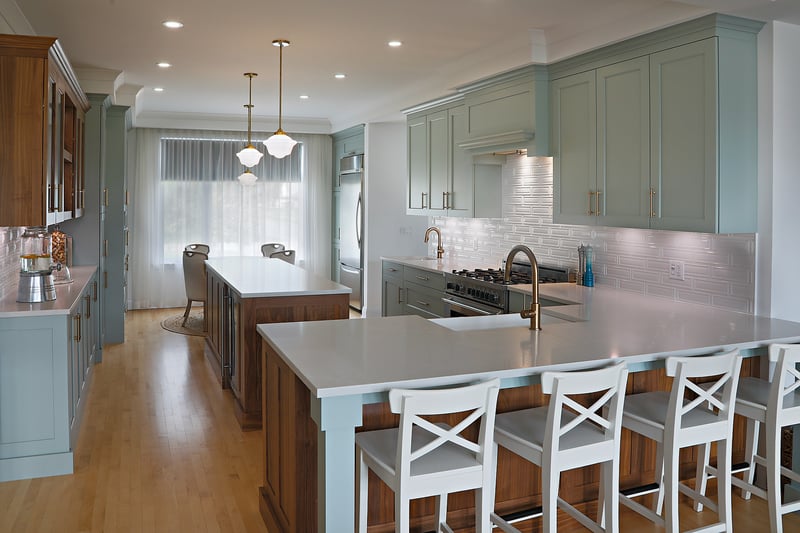
For that reason, plywood cabinet boxes are roughly 30% more expensive than basic particle board cabinet boxes.
In terms of NuGreen particle board cabinets, you can generally expect to pay around 15% more than basic particlecore cabinet boxes.
If you have a large cabinetry system in your kitchen, simply opting for standard particle board boxes instead of plywood will save you thousands of dollars.
But, if you have a smaller kitchen or a flexible budget, you might be inclined to pay up for plywood cabinet boxes.
Plywood vs. Particle Board: Which Cabinet Box is Right for You?
For such an unheralded aspect of the kitchen design process, cabinet boxes can play a surprisingly large role in a kitchen’s function.
Do you prefer the strength of plywood cabinets and don’t mind the added expense?
Or maybe you desire the smooth melamine finish of particle board cabinets and appreciate their cost-effective nature.
Whichever style you fancy, it’s always important to determine your budget and kitchen lifestyle to ensure you select the cabinet boxes that best suit your home.
Discover Deslaurier Custom Cabinets
Want to compare the differences between plywood and particle board cabinet boxes for your dream kitchen? Then you’ve come to the right place!
Book a free consultation with a Deslaurier kitchen expert at our Jupiter, Florida showroom today!
If you have your eye on custom cabinetry, Deslaurier Custom Cabinets has everything you need. With over 40 years of experience to our name, we provide our clients with a fully customized design process with our talented team of designers.
Interested in becoming an authorized Deslaurier dealer? Visit our Become a Dealer page to learn more! Live outside the area? Find a Dealer to connect with a Deslaurier dealer near you!
